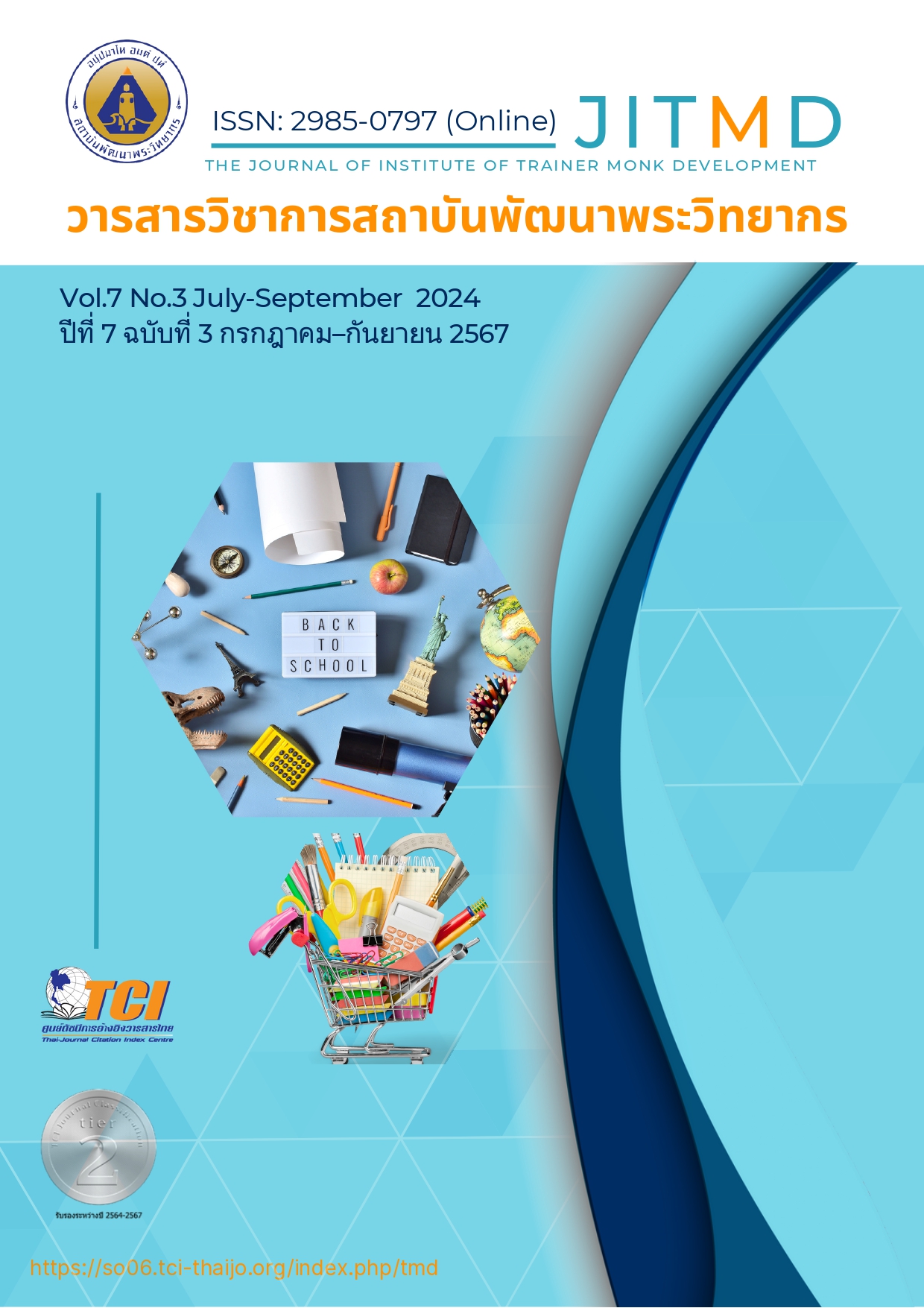The Evaluation of Reading Engagement Project in Schools Under Nonthaburi Primary Education Service Area Offices
Main Article Content
Abstract
The objectives of this research were to 1) evaluate the reading engagement project in terms of input, implementation, and result dimensions, and 2) analyze weaknesses and strengths of the implementation of the reading engagement project. This research was quantitative research studies the sample consisted of schools under the Nonthaburi Primary Educational Service Area Office. Research tools comprised two following issues: 1) questionnaires regarding the implementation of the project in terms of input, implementation, and result from administrators and teachers. 2) questionnaires regarding the implementation of the project in terms from students. Quantitative data were analyzed using frequency, percentage, mean, and standard deviation. Research results: 1) The project evaluation found that (1.1), for the project input dimension, school administrators viewed that, in overall, the project inputs were largely sufficient. and teachers viewed that, in overall, the project inputs were largely sufficient. Specifically, staffs participated in project activities to solve students’ reading problems and project budget was sufficient; (1.2), for the process dimension, it was found that school administrators expressed that, in overall, the project process was highly appropriate. and teachers expressed that, in overall, the project process was highly appropriate and that school clearly assigned staffs as project evaluators; (1.3), for the result dimension, school administrators and teachers viewed that the project results were highly appropriate and teachers viewed that the project results were highly appropriate. 2) The project strengths included the active participation among school administrators and teachers to solve students’ reading problems, while the weaknesses included an absence of some students who did not cooperate in some activities and did not maintain personal reading diaries/documents. In addition, it was found that schools needed some slight supports in terms of budget, media, project equipment, and technology.
Article Details

This work is licensed under a Creative Commons Attribution-NonCommercial-NoDerivatives 4.0 International License.
บทความที่ได้รับการตีพิมพ์เป็นลิขสิทธิ์ของวารสารวิชาการสถาบันพัฒนาพระวิทยากร
ข้อความที่ปรากฎอยู่ในบทความที่ได้รับการตีพิมพ์ในวารสาร ถือเป็นความรับผิดชอบของผู้เขียนบทความ และข้อคิดเห็นนั้นไม่ถือว่าเป็นทัศนะและความรับผิดชอบของกองบรรณาธิการวารสารวิชาการสถาบันพัฒนาพระวิทยากร
References
สำนักงานเขตพื้นที่การศึกษาประถมศึกษานนทบุรี เขต 1. (2565). แผนพัฒนาการศึกษาขั้นพื้นฐานระยะ 5 ปี (พ.ศ. 2566 – 2570). นนทบุรี: กลุ่มนโยบายและแผน.
สำนักงานเขตพื้นที่การศึกษาประถมศึกษานนทบุรี เขต 1. (2565). รายงานผลการดำเนินงานประจำปีงบประมาณ พ.ศ. 2565. นนทบุรี: กลุ่มนโยบายและแผน.
สำนักงานเขตพื้นที่การศึกษาประถมศึกษานนทบุรี เขต 2. (2565). ข้อมูลสารสนเทศทางการศึกษาปีการศึกษา 2565. นนทบุรี: กลุ่มส่งเสริมการศึกษาทางไกล เทคโนโลยีสารสนเทศและการสื่อสาร.
สำนักงานคณะกรรมการกฤษฎีกา. (2562). พระราชบัญญัติการศึกษาแห่งชาติ 2542. กรุงเทพมหานคร: พัชรภรณ์การพิมพ์.
สำนักงานคณะกรรมการการศึกษาขั้นพื้นฐาน. (2556). แนวทางการดำเนินงานส่งเสริมนิสัยรักการอ่านและพัฒนาห้องสมุดโรงเรียน. กรุงเทพมหานคร: โรงพิมพ์ชุมนุมสหกรณ์การเกษตรแห่งประเทศไทย จำกัด.
สำนักงานคณะกรรมการการศึกษาขั้นพื้นฐาน. (2562, 5 ธันวาคม). สพฐ.เพิ่มอ่าน-คิดวิเคราะห์ให้เด็กไทย. ไทยรัฐ. น. 1.
สำนักทดสอบทางการศึกษา สำนักงานคณะกรรมการการศึกษาขั้นพื้นฐาน กระทรวงศึกษาธิการ. (2564). รายงานผลการประเมินคุณภาพผู้เรียน (NT) ชั้นประถมศึกษาปีที่ 3 ปีการศึกษา 2564. กรุงเทพมหานคร: ห้างหุ้นส่วนจำกัด โรงพิมพ์อักษรไทย (น.ส.พ.ฟ้าเมืองไทย).
สำนักวิชาการและมาตรฐานการศึกษาขั้นพื้นฐาน สำนักงานคณะกรรมการการศึกษาขั้นพื้นฐาน กระทรวงศึกษาธิการ. (2549). เอกสารแนวทางการดำเนินงานปฏิรูปการเรียนการสอนตาม เจตนารมณ์กระทรวงศึกษาธิการ “2549 ปีแห่งการปฏิรูปการเรียนการสอน” แนวทางการจัดกิจกรรมส่งเสริมนิสัยรักการอ่าน. กรุงเทพมหานคร: โรงพิมพ์ชุมนุมสหกรณ์การเกษตรแห่งประเทศไทย จำกัด.
สุธารัตน์ ศรีวาลัย. (2560). “การประเมินโครงการรักการอ่านของโรงเรียนสิริรัตนาธร โดยประยุกต์ใช้รูปแบบการประเมินแบบ CPO”. วิทยานิพนธ์ปริญญาศึกษาศาสตรมหาบัณฑิต สาขาวิชาการประเมินและการวิจัยการศึกษา. มหาวิทยาลัยรามคำแหง.
วิทยากร เชียงกูล. (2555). การรณรงค์ให้เด็กและเยาวชนไทยรักการอ่าน–กลยุทธ์สำคัญในการปฏิรูปการศึกษา. วารสารสังคมศาสตร์และมนุษยศาสตร์, 38(2): 1-15.


